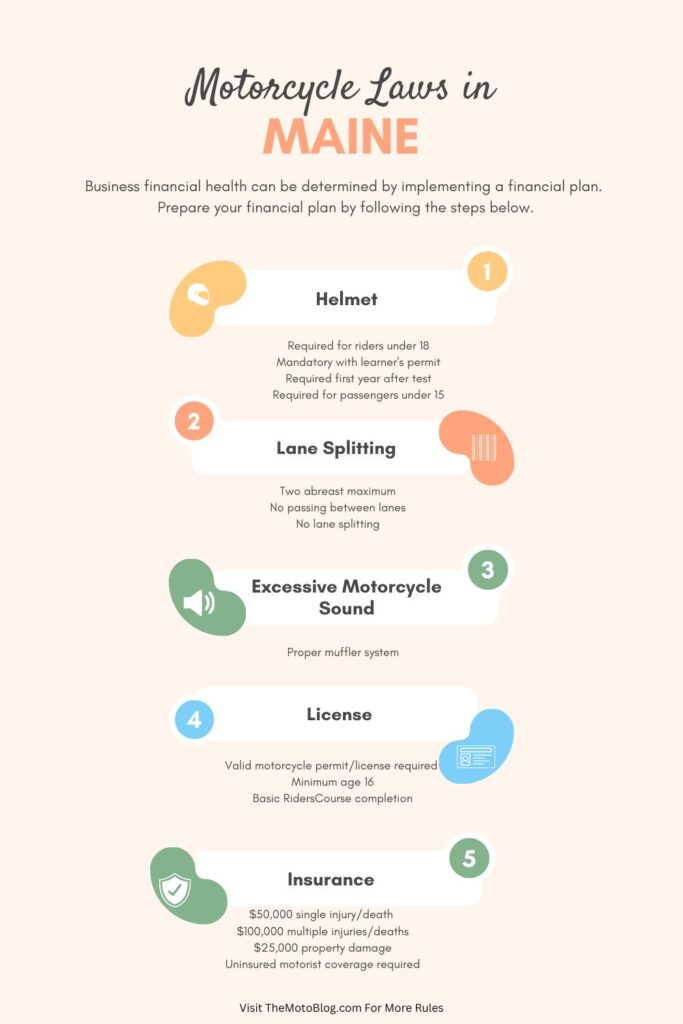Motorcycle Laws in Maine: A Comprehensive Guide for Riders
For motorcyclists exploring New England’s scenic routes, understanding Maine’s motorcycle laws is essential for safe and legal riding. While sharing similarities with New Hampshire and Vermont, Maine maintains its distinct regulations that all riders must follow. Whether you’re a resident or planning to cross state lines from Massachusetts, this comprehensive guide covers everything you need to know about motorcycle laws in the Pine Tree State.

| Category | Requirements |
|---|---|
| Licensing | – Valid motorcycle permit/license required – Minimum age 16 – Basic RidersCourse completion – Written and vision tests mandatory |
| Helmet Use | – Required for riders under 18 – Mandatory with learner’s permit – Required first year after test – Required for passengers under 15 |
| Insurance | – $50,000 single injury/death – $100,000 multiple injuries/deaths – $25,000 property damage – Uninsured motorist coverage required |
| Equipment | – At least one mirror required – Headlights always on – Proper muffler system – Handlebars below shoulder height |
| Operation | – Max 2 motorcycles per lane – No lane splitting – One person per seat – Max 2 persons in sidecar |
| Inspection | – Annual safety inspection required – Visible rear sticker – Documentation while riding – Frame or plate mounted |
| Passengers | – Permanent seating required – One person per seat – Under 15 must wear helmet – Max 2 in sidecar |
| Lane Usage | – Two abreast maximum – No passing between lanes – No lane splitting – Single file recommended |
Licensing Requirements
Class M License Requirements
Maine requires all motorcycle operators to possess a valid Class M license. The state recognizes licenses from other jurisdictions for non-resident riders. To obtain a Maine motorcycle license, riders must complete several requirements:
- Valid motorcycle permit or license verification
- Completion of state-approved Basic RidersCourse (BRC)
- Passing written and vision tests
- Meeting minimum age requirements
Age and Educational Requirements
The state enforces strict age-related regulations:
- Minimum age of 16 for motorcycle permits and licenses
- Mandatory basic driver education for riders under 18
- Additional requirements for instructional permit holders
Safety Equipment Requirements
Helmet Laws
Maine’s helmet laws are specific and situation-based:
- Mandatory for riders under 18
- Required for learner’s permit holders
- Compulsory for operators in their first year post-test
- Required for passengers under 15
Additional Safety Equipment
The state mandates several safety features:
- At least one mirror providing 200-foot rear visibility
- Properly functioning headlights, required at all times
- Handlebars not exceeding operator’s shoulder height
Operating Rules
Lane Usage and Passenger Regulations
Maine enforces specific rules for motorcycle operation:
- Maximum two motorcycles abreast in one lane
- Lane splitting prohibited
- One person per designated seat
- Maximum two persons in sidecars
Insurance and Documentation
Insurance Requirements
Motorcyclists must maintain minimum liability coverage:
- $50,000 for single death/injury
- $100,000 for multiple injuries/deaths
- $25,000 for property damage
- Mandatory uninsured motorist and medical payments coverage
Registration and Inspection
All motorcycles require:
- Current safety inspection
- Visible rear-mounted inspection sticker
- Registration documentation while operating
Vehicle Specifications and Equipment
Sound and Equipment Regulations
Maine law specifies:
- Compliant lighting systems
- Proper muffler equipment required
- Prohibition of deliberately amplified engine noise
- Permanent seating for all riders
Maine’s motorcycle laws strike a balance between rider freedom and public safety, similar to neighboring New Hampshire and Vermont. These regulations ensure safe operation while allowing riders to enjoy Maine’s scenic routes. For those planning multi-state trips, particularly through Massachusetts, understanding these varying requirements is crucial for compliance and safety. By following these guidelines, riders can confidently navigate Maine’s roadways while maintaining legal compliance.
Motorcycle Laws in the US By States
If you liked this article, then please subscribe to our YouTube Channel for more Bike Videos. You can also find us on Instagram, Twitter and Facebook.
Disclosure: As an Amazon Associate, I earn from qualifying purchases. Read more about Amazon Affiliate Disclaimer.

Vishwanath Mathpati
I am Vishwanath Mathpati, a full-time Blogger and Motorcyclist from Bidar, Karnataka. I love writing about my Motorcycles Stories and Riding Gears on this blog.
Know More About Me.






